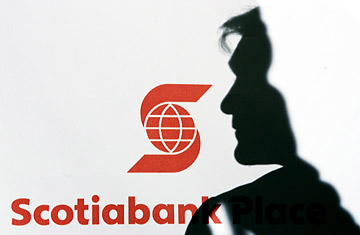
Scotiabank, along with other large Canadian banks, is faring better than its U.S. peers
In the midst of the worst financial crisis since the Great Depression, Canada has joined the ranks of governments that in recent weeks stepped up to help banks cope with more fallout from bad U.S. subprime mortgages. In Canada's case, however, the reason for the assistance is a little different from some of its G-7 partners. Unlike banks in the U.S., Britain and Germany, which needed to be bailed out with hundreds of billions of dollars in new capital, Canada's major banks are solid and solvent. They don't need any help to work through their subprime exposure. (Find out 10 things to do with your money.)
So why did Ottawa agree to insure the money they routinely borrow from other banks, a practice that keeps their credit operations liquid? Ironically, the troubled non-Canadian institutions that received capital injections and loan guarantees in other countries now carry a government seal of approval that tilts the playing field in their favor when it comes to borrowing. That leaves Canada's big banks, including Scotiabank, TD Bank Financial Group, RBC Royal Bank and CIBC, at a competitive disadvantage. So the government acted to level the field, not to aid troubled banks. (See pictures of the global financial crisis.)
Why has Canada withstood the subprime tornado better than other countries, and should the Canadian banking system be a model for G-7 and G-20 leaders when they gather in Washington on Nov. 15? Consider that the Geneva-based World Economic Forum, an influential think tank whose annual conference attracts the likes of Bill Gates and Tony Blair, earlier this month ranked Canada's banking system as the soundest in the world. The U.S. came in at No. 40, and Germany and Britain ranked 39 and 44, respectively. (Switzerland was No. 16, just ahead of Namibia.) "For Canadian banks, having higher capital ratios than anyone else in the world is a source of pride," says analyst Mario Mendonca with Toronto-based investment bank Genuity Capital Markets. (Read "Four Steps to Ending the Foreclosure Crisis.")
The average capital reserves for Canada's Big Six banks — defined as Tier 1 capital (common shares, retained earnings and non-cumulative preferred shares) to risk-adjusted assets — is 9.8%, several percentage points above the 7% required by Canada's federal bank regulator. That's a little better than major U.S. commercial banks like Bank of America, but significantly higher than an average capital ratio of about 4% for U.S. investment banks and 3.3% for European commercial banks.
Another factor that helped make Canada the new gold standard in banking was Ottawa's decision in the late 1980s to allow commercials banks to acquire investment dealers on Toronto's Bay Street, the country's financial hub. As a result, these institutions are subject to the same strict rules as commercial banks, while U.S. investment dealers are subject to only light supervision from the Securities and Exchange Commission. Morgan Stanley and Goldman Sachs, of course, will now be under the U.S. Federal Reserve's supervision since they have been chartered as bank-holding companies.
Canada's banks make bad investments on occasion. When Toronto-based CIBC, Canada's most aggressive big bank, took $3.5 billion in charges against the U.S. subprime debacle, federal regulators quickly arrived on the scene. But here's the difference: CIBC ended up selling $2.94 billion worth of its own shares in the first quarter of this year to shore up capital reserves. "The relationship between government and banks is a positive one," says Minister of Finance Jim Flaherty. "We have a lot of discussions and regular meetings. The common goal is a sound financial system."
There is, of course, a flip side to Canada's regulatory system. When the global economy was flying high, Canadian banks complained about not being allowed to merge to become more significant international players. "In hindsight, that decision may have saved Canada from having a Royal Bank of Scotland on its hands," says Lawrence Booth, a finance specialist at the University of Toronto's Rotman School of Management, referring to the overly ambitious bank's bailout earlier this month by the British government.
Says FFlaherty: "The credit crisis we're facing is the result of unbridled greed. We need to bridle greed." Perhaps when world leaders sit down in Washington to forge a 21st-century New Deal for the global financial system, it may have more than a smattering of Canadian banking know-how.
